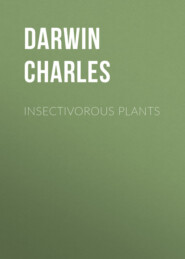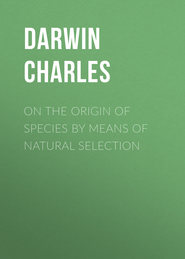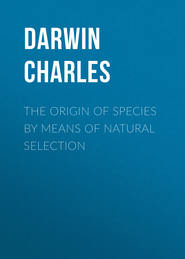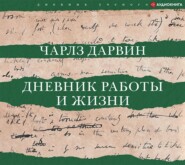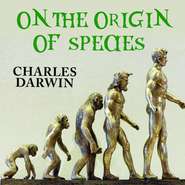По всем вопросам обращайтесь на: info@litportal.ru
(©) 2003-2024.
✖
Life and Letters of Charles Darwin — Volume 1
Настройки чтения
Размер шрифта
Высота строк
Поля
I have got Bentham ('British Flora.'), and am charmed with it, and William (who has just started for a tour abroad) has been making out all sorts of new (to me) plants capitally. The little scraps of information are so capital...The English names in the analytical keys drive us mad: give them by all means, but why on earth [not] make them subordinate to the Latin; it puts me in a passion. W. charged into the Compositae and Umbelliferae like a hero, and demolished ever so many in grand style.
I pass my time by doing daily a couple of hours of my Abstract, and I find it amusing and improving work. I am now most heartily obliged to you and Lyell for having set me on this; for I shall, when it is done, be able to finish my work with greater ease and leisure. I confess I hated the thought of the job; and now I find it very unsatisfactory in not being able to give my reasons for each conclusion.
I will be longer than I expected; it will take thirty-five of my MS. folio pages to give an abstract on variation under domestication alone; but I will try to put in nothing which does not seem to me of some interest, and which was once new to me. It seems a queer plan to give an abstract of an unpublished work; nevertheless, I repeat, I am extremely glad I have begun in earnest on it.
I hope you and Mrs. Hooker will have a very very pleasant tour. Farewell, my dear Hooker.
Yours affectionately, C. DARWIN.
CHARLES DARWIN TO J.D. HOOKER. Norfolk House, Shanklin, Isle of Wight, Thursday [August 5, 1858].
My dear Hooker,
I should think the note apologetical about the style of the abstract was best as a note...But I write now to ask you to send me by return of post the MS. on big genera, that I may make an abstract of a couple of pages in length. I presume that you have quite done with it, otherwise I would not for anything have it back. If you tie it with string, and mark it MS. for printing, it will not cost, I should think, more than 4 pence. I shall wish much to say that you have read this MS. and concur; but you shall, before I read it to the Society, hear the sentence.
What you tell me after speaking with Busk about the length of the Abstract is an IMMENSE relief to me; it will make the labour far less, not having to shorten so much every single subject; but I will try not to be too diffusive. I fear it will spoil all interest in my book (The larger book begun in 1856.), whenever published. The Abstract will do very well to divide into several parts: thus I have just finished "Variation under Domestication," in forty-four MS. pages, and that would do for one evening; but I should be extremely sorry if all could not be published together.
What else you say about my Abstract pleases me highly, but frightens me, for I fear I shall never be able to make it good enough. But how I do run on about my own affairs to you!
I was astonished to see Sir W. Hooker's card here two or three days ago: I was unfortunately out walking. Henslow, also, has written to me, proposing to come to Down on the 9th, but alas, I do not return till the 13th, and my wife not till a week later; so that I am also most sorry to think I shall not see you, for I should not like to leave home so soon. I had thought of going to London and running down for an hour or two to Kew...
CHARLES DARWIN TO J.D. HOOKER. Norfolk House, Shanklin, Isle of Wight, [August] [1858].
My dear Hooker,
I write merely to say that the MS. came safely two or three days ago. I am much obliged for the correction of style: I find it unutterably difficult to write clearly. When we meet I must talk over a few points on the subject.
You speak of going to the sea-side somewhere; we think this the nicest seaside place which we have ever seen, and we like Shanklin better than other spots on the south coast of the island, though many are charming and prettier, so that I would suggest your thinking of this place. We are on the actual coast; but tastes differ so much about places.
If you go to Broadstairs, when there is a strong wind from the coast of France and in fine, dry, warm weather, look out, and you will PROBABLY (!) see thistle-seeds blown across the Channel. The other day I saw one blown right inland, and then in a few minutes a second one and then a third; and I said to myself, God bless me, how many thistles there must be in France; and I wrote a letter in imagination to you. But I then looked at the LOW clouds, and noticed that they were not coming inland, so I feared a screw was loose. I then walked beyond a headland, and found the wind parallel to the coast, and on this very headland a noble bed of thistles, which by every wide eddy were blown far out to sea, and then came right in at right angles to the shore! One day such a number of insects were washed up by the tide, and I brought to life thirteen species of Coleoptera; not that I suppose these came from France. But do you watch for thistle-seed as you saunter along the coast...
CHARLES DARWIN TO ASA GRAY. August 11th [1858].
My dear Gray,
Your note of July 27th has just reached me in the Isle of Wight. It is a real and great pleasure to me to write to you about my notions; and even if it were not so, I should be a most ungrateful dog, after all the invaluable assistance you have rendered me, if I did not do anything which you asked.
I have discussed in my long MS. the later changes of climate and the effect on migration, and I will here give you an ABSTRACT of an ABSTRACT (which latter I am preparing of my whole work for the Linnean Society). I cannot give you facts, and I must write dogmatically, though I do not feel so on any point. I may just mention, in order that you may believe that I have SOME foundation for my views, that Hooker has read my MS., and though he at first demurred to my main point, he has since told me that further reflection and new facts have made him a convert.
In the older, or perhaps newer, Pliocene age (a little BEFORE the Glacial epoch) the temperature was higher; of this there can be little doubt; the land, on a LARGE SCALE, held much its present disposition: the species were mainly, judging from shells, what they are now. At this period when all animals and plants ranged 10 or 15 degrees nearer the poles, I believe the northern part of Siberia and of North America being almost CONTINUOUS, were peopled (it is quite possible, considering the shallow water, that Behring Straits were united, perhaps a little southward) by a nearly uniform fauna and flora, just as the Arctic regions now are. The climate then became gradually colder till it became what it now is; and then the temperate parts of Europe and America would be separated, as far as migration is concerned, just as they now are. Then came on the Glacial period, driving far south all living things; middle or even southern Europe being peopled with Arctic productions; as the warmth returned, the Arctic productions slowly crawled up the mountains as they became denuded of snow; and we now see on their summits the remnants of a once continuous flora and fauna. This is E. Forbes' theory, which, however, I may add, I had written out four years before he published.
Some facts have made me vaguely SUSPECT that between the glacial and the present temperature there was a period of SLIGHTLY greater warmth. According to my modification-doctrines, I look at many of the species of North America which CLOSELY represent those of Europe, as having become modified since the Pliocene period, when in the northern part of the world there was nearly free communication between the old and new worlds. But now comes a more important consideration; there is a considerable body of geological evidence that during the Glacial epoch the whole world was colder; I inferred that, many years ago, from erratic boulder phenomena carefully observed by me on both the east and west coast of South America. Now I am so bold as to believe that at the height of the Glacial epoch, AND WHEN ALL TROPICAL PRODUCTIONS MUST HAVE BEEN CONSIDERABLY DISTRESSED, that several temperate forms slowly travelled into the heart of the Tropics, and even reached the southern hemisphere; and some few southern forms penetrated in a reverse direction northward. (Heights of Borneo with Australian forms, Abyssinia with Cape forms.) Wherever there was nearly continuous HIGH land, this migration would have been immensely facilitated; hence the European character of the plants of Tierra del Fuego and summits of Cordilleras; hence ditto on Himalaya. As the temperature rose, all the temperate intruders would crawl up the mountains. Hence the European forms on Nilgherries, Ceylon, summit of Java, Organ Mountains of Brazil. But these intruders being surrounded with new forms would be very liable to be improved or modified by natural selection, to adapt them to the new forms with which they had to compete; hence most of the forms on the mountains of the Tropics are not identical, but REPRESENTATIVE forms of North temperate plants.
There are similar classes of facts in marine productions. All this will appear very rash to you, and rash it may be; but I am sure not so rash as it will at first appear to you: Hooker could not stomach it at all at first, but has become largely a convert. From mammalia and shallow sea, I believe Japan to have been joined to main land of China within no remote period; and then the migration north and south before, during, and after the Glacial epoch would act on Japan, as on the corresponding latitude of China and the United States.
I should beyond anything like to know whether you have any Alpine collections from Japan, and what is their character. This letter is miserably expressed, but perhaps it will suffice to show what I believe have been the later main migrations and changes of temperature...
CHARLES DARWIN TO J.D. HOOKER. [Down] October 6th, 1858.
...If you have or can make leisure, I should very much like to hear news of Mrs. Hooker, yourself, and the children. Where did you go, and what did you do and are doing? There is a comprehensive text.
You cannot tell how I enjoyed your little visit here, it did me much good. If Harvey is still with you, pray remember me very kindly to him.
...I am working most steadily at my Abstract, but it grows to an inordinate length; yet fully to make my view clear (and never giving briefly more than a fact or two, and slurring over difficulties), I cannot make it shorter. It will yet take me three or four months; so slow do I work, though never idle. You cannot imagine what a service you have done me in making me make this Abstract; for though I thought I had got all clear, it has clarified my brains very much, by making me weigh the relative importance of the several elements.
I have been reading with much interest your (as I believe it to be) capital memoir of R. Brown in the "Gardeners' Chronicle"...
CHARLES DARWIN TO J.D. HOOKER. Down, October 12th, [1858].
...I have sent eight copies (Of the joint paper by C. Darwin and A.R. Wallace.) by post to Wallace, and will keep the others for him, for I could not think of any one to send any to.
I pray you not to pronounce too strongly against Natural Selection, till you have read my abstract, for though I dare say you will strike out MANY difficulties, which have never occurred to me; yet you cannot have thought so fully on the subject as I have.
I expect my Abstract will run into a small volume, which will have to be published separately...
What a splendid lot of work you have in hand.
Ever yours, C. DARWIN.
CHARLES DARWIN TO J.D. HOOKER. Down, October 13th [1858].
...I have been a little vexed at myself at having asked you not "to pronounce too strongly against Natural Selection." I am sorry to have bothered you, though I have been much interested by your note in answer. I wrote the sentence without reflection. But the truth is, that I have so accustomed myself, partly from being quizzed by my non-naturalist relations, to expect opposition and even contempt, that I forgot for the moment that you are the one living soul from whom I have constantly received sympathy. Believe [me] that I never forget for even a minute how much assistance I have received from you. You are quite correct that I never even suspected that my speculations were a "jam-pot" to you; indeed, I thought, until quite lately, that my MS. had produced no effect on you, and this has often staggered me. Nor did I know that you had spoken in general terms about my work to our friends, excepting to dear old Falconer, who some few years ago once told me that I should do more mischief than any ten other naturalists would do good, [and] that I had half spoiled you already! All this is stupid egotistical stuff, and I write it only because you may think me ungrateful for not having valued and understood your sympathy; which God knows is not the case. It is an accursed evil to a man to become so absorbed in any subject as I am in mine.
I was in London yesterday for a few hours with Falconer, and he gave me a magnificent lecture on the age of man. We are not upstarts; we can boast of a pedigree going far back in time coeval with extinct species. He has a grand fact of some large molar tooth in the Trias.
I am quite knocked up, and am going next Monday to revive under Water-cure at Moor Park.
My dear Hooker, yours affectionately, C. DARWIN.
CHARLES DARWIN TO J.D. HOOKER. November 1858.
...I had vowed not to mention my everlasting Abstract to you again, for I am sure I have bothered you far more than enough about it; but, as you allude to its previous publication, I may say that I have the chapters on Instinct and Hybridism to abstract, which may take a fortnight each; and my materials for Palaeontology, Geographical Distribution, and Affinities, being less worked up, I dare say each of these will take me three weeks, so that I shall not have done at soonest till April, and then my Abstract will in bulk make a small volume. I never give more than one or two instances, and I pass over briefly all difficulties, and yet I cannot make my Abstract shorter, to be satisfactory, than I am now doing, and yet it will expand to a small volume...
[About this time my father revived his old knowledge of beetles in helping his boys in their collecting. He sent a short notice to the 'Entomologist's Weekly Intelligencer,' June 25th, 1859, recording the capture of Licinus silphoides, Clytus mysticus, Panagaeus 4-pustulatus. The notice begins with the words, "We three very young collectors having lately taken in the parish of Down," etc., and is signed by three of his boys, but was clearly not written by them. I have a vivid recollection of the pleasure of turning out my bottle of dead beetles for my father to name, and the excitement, in which he fully shared, when any of them proved to be uncommon ones. The following letters to Mr. Fox (November 13, 1858), and to Sir John Lubbock, illustrate this point:]
CHARLES DARWIN TO W.D. FOX. Down, November 13th [1858].
...W., my son, is now at Christ's College, in the rooms above yours. My old Gyp, Impey, was astounded to hear that he was my son, and very simply asked, "Why, has he been long married?" What pleasant hours those were when I used to come and drink coffee with you daily! I am reminded of old days by my third boy having just begun collecting beetles, and he caught the other day Brachinus crepitans, of immortal Whittlesea Mere memory. My blood boiled with old ardour when he caught a Licinus — a prize unknown to me...
CHARLES DARWIN TO JOHN LUBBOCK. Thursday [before 1857].
Dear Lubbock,
I do not know whether you care about beetles, but for the chance I send this in a bottle, which I never remember having seen; though it is excessively rash to speak from a twenty-five-year old remembrance. Whenever we meet you can tell me whether you know it...
I feel like an old war-horse at the sound of the trumpet, when I read about the capturing of rare beetles — is not this a magnanimous simile for a decayed entomologist? — It really almost makes me long to begin collecting again. Adios.
"Floreat Entomologia"! — to which toast at Cambridge I have drunk many a glass of wine. So again, "Floreat Entomologia." N.B. I have NOT now been drinking any glasses full of wine.
I pass my time by doing daily a couple of hours of my Abstract, and I find it amusing and improving work. I am now most heartily obliged to you and Lyell for having set me on this; for I shall, when it is done, be able to finish my work with greater ease and leisure. I confess I hated the thought of the job; and now I find it very unsatisfactory in not being able to give my reasons for each conclusion.
I will be longer than I expected; it will take thirty-five of my MS. folio pages to give an abstract on variation under domestication alone; but I will try to put in nothing which does not seem to me of some interest, and which was once new to me. It seems a queer plan to give an abstract of an unpublished work; nevertheless, I repeat, I am extremely glad I have begun in earnest on it.
I hope you and Mrs. Hooker will have a very very pleasant tour. Farewell, my dear Hooker.
Yours affectionately, C. DARWIN.
CHARLES DARWIN TO J.D. HOOKER. Norfolk House, Shanklin, Isle of Wight, Thursday [August 5, 1858].
My dear Hooker,
I should think the note apologetical about the style of the abstract was best as a note...But I write now to ask you to send me by return of post the MS. on big genera, that I may make an abstract of a couple of pages in length. I presume that you have quite done with it, otherwise I would not for anything have it back. If you tie it with string, and mark it MS. for printing, it will not cost, I should think, more than 4 pence. I shall wish much to say that you have read this MS. and concur; but you shall, before I read it to the Society, hear the sentence.
What you tell me after speaking with Busk about the length of the Abstract is an IMMENSE relief to me; it will make the labour far less, not having to shorten so much every single subject; but I will try not to be too diffusive. I fear it will spoil all interest in my book (The larger book begun in 1856.), whenever published. The Abstract will do very well to divide into several parts: thus I have just finished "Variation under Domestication," in forty-four MS. pages, and that would do for one evening; but I should be extremely sorry if all could not be published together.
What else you say about my Abstract pleases me highly, but frightens me, for I fear I shall never be able to make it good enough. But how I do run on about my own affairs to you!
I was astonished to see Sir W. Hooker's card here two or three days ago: I was unfortunately out walking. Henslow, also, has written to me, proposing to come to Down on the 9th, but alas, I do not return till the 13th, and my wife not till a week later; so that I am also most sorry to think I shall not see you, for I should not like to leave home so soon. I had thought of going to London and running down for an hour or two to Kew...
CHARLES DARWIN TO J.D. HOOKER. Norfolk House, Shanklin, Isle of Wight, [August] [1858].
My dear Hooker,
I write merely to say that the MS. came safely two or three days ago. I am much obliged for the correction of style: I find it unutterably difficult to write clearly. When we meet I must talk over a few points on the subject.
You speak of going to the sea-side somewhere; we think this the nicest seaside place which we have ever seen, and we like Shanklin better than other spots on the south coast of the island, though many are charming and prettier, so that I would suggest your thinking of this place. We are on the actual coast; but tastes differ so much about places.
If you go to Broadstairs, when there is a strong wind from the coast of France and in fine, dry, warm weather, look out, and you will PROBABLY (!) see thistle-seeds blown across the Channel. The other day I saw one blown right inland, and then in a few minutes a second one and then a third; and I said to myself, God bless me, how many thistles there must be in France; and I wrote a letter in imagination to you. But I then looked at the LOW clouds, and noticed that they were not coming inland, so I feared a screw was loose. I then walked beyond a headland, and found the wind parallel to the coast, and on this very headland a noble bed of thistles, which by every wide eddy were blown far out to sea, and then came right in at right angles to the shore! One day such a number of insects were washed up by the tide, and I brought to life thirteen species of Coleoptera; not that I suppose these came from France. But do you watch for thistle-seed as you saunter along the coast...
CHARLES DARWIN TO ASA GRAY. August 11th [1858].
My dear Gray,
Your note of July 27th has just reached me in the Isle of Wight. It is a real and great pleasure to me to write to you about my notions; and even if it were not so, I should be a most ungrateful dog, after all the invaluable assistance you have rendered me, if I did not do anything which you asked.
I have discussed in my long MS. the later changes of climate and the effect on migration, and I will here give you an ABSTRACT of an ABSTRACT (which latter I am preparing of my whole work for the Linnean Society). I cannot give you facts, and I must write dogmatically, though I do not feel so on any point. I may just mention, in order that you may believe that I have SOME foundation for my views, that Hooker has read my MS., and though he at first demurred to my main point, he has since told me that further reflection and new facts have made him a convert.
In the older, or perhaps newer, Pliocene age (a little BEFORE the Glacial epoch) the temperature was higher; of this there can be little doubt; the land, on a LARGE SCALE, held much its present disposition: the species were mainly, judging from shells, what they are now. At this period when all animals and plants ranged 10 or 15 degrees nearer the poles, I believe the northern part of Siberia and of North America being almost CONTINUOUS, were peopled (it is quite possible, considering the shallow water, that Behring Straits were united, perhaps a little southward) by a nearly uniform fauna and flora, just as the Arctic regions now are. The climate then became gradually colder till it became what it now is; and then the temperate parts of Europe and America would be separated, as far as migration is concerned, just as they now are. Then came on the Glacial period, driving far south all living things; middle or even southern Europe being peopled with Arctic productions; as the warmth returned, the Arctic productions slowly crawled up the mountains as they became denuded of snow; and we now see on their summits the remnants of a once continuous flora and fauna. This is E. Forbes' theory, which, however, I may add, I had written out four years before he published.
Some facts have made me vaguely SUSPECT that between the glacial and the present temperature there was a period of SLIGHTLY greater warmth. According to my modification-doctrines, I look at many of the species of North America which CLOSELY represent those of Europe, as having become modified since the Pliocene period, when in the northern part of the world there was nearly free communication between the old and new worlds. But now comes a more important consideration; there is a considerable body of geological evidence that during the Glacial epoch the whole world was colder; I inferred that, many years ago, from erratic boulder phenomena carefully observed by me on both the east and west coast of South America. Now I am so bold as to believe that at the height of the Glacial epoch, AND WHEN ALL TROPICAL PRODUCTIONS MUST HAVE BEEN CONSIDERABLY DISTRESSED, that several temperate forms slowly travelled into the heart of the Tropics, and even reached the southern hemisphere; and some few southern forms penetrated in a reverse direction northward. (Heights of Borneo with Australian forms, Abyssinia with Cape forms.) Wherever there was nearly continuous HIGH land, this migration would have been immensely facilitated; hence the European character of the plants of Tierra del Fuego and summits of Cordilleras; hence ditto on Himalaya. As the temperature rose, all the temperate intruders would crawl up the mountains. Hence the European forms on Nilgherries, Ceylon, summit of Java, Organ Mountains of Brazil. But these intruders being surrounded with new forms would be very liable to be improved or modified by natural selection, to adapt them to the new forms with which they had to compete; hence most of the forms on the mountains of the Tropics are not identical, but REPRESENTATIVE forms of North temperate plants.
There are similar classes of facts in marine productions. All this will appear very rash to you, and rash it may be; but I am sure not so rash as it will at first appear to you: Hooker could not stomach it at all at first, but has become largely a convert. From mammalia and shallow sea, I believe Japan to have been joined to main land of China within no remote period; and then the migration north and south before, during, and after the Glacial epoch would act on Japan, as on the corresponding latitude of China and the United States.
I should beyond anything like to know whether you have any Alpine collections from Japan, and what is their character. This letter is miserably expressed, but perhaps it will suffice to show what I believe have been the later main migrations and changes of temperature...
CHARLES DARWIN TO J.D. HOOKER. [Down] October 6th, 1858.
...If you have or can make leisure, I should very much like to hear news of Mrs. Hooker, yourself, and the children. Where did you go, and what did you do and are doing? There is a comprehensive text.
You cannot tell how I enjoyed your little visit here, it did me much good. If Harvey is still with you, pray remember me very kindly to him.
...I am working most steadily at my Abstract, but it grows to an inordinate length; yet fully to make my view clear (and never giving briefly more than a fact or two, and slurring over difficulties), I cannot make it shorter. It will yet take me three or four months; so slow do I work, though never idle. You cannot imagine what a service you have done me in making me make this Abstract; for though I thought I had got all clear, it has clarified my brains very much, by making me weigh the relative importance of the several elements.
I have been reading with much interest your (as I believe it to be) capital memoir of R. Brown in the "Gardeners' Chronicle"...
CHARLES DARWIN TO J.D. HOOKER. Down, October 12th, [1858].
...I have sent eight copies (Of the joint paper by C. Darwin and A.R. Wallace.) by post to Wallace, and will keep the others for him, for I could not think of any one to send any to.
I pray you not to pronounce too strongly against Natural Selection, till you have read my abstract, for though I dare say you will strike out MANY difficulties, which have never occurred to me; yet you cannot have thought so fully on the subject as I have.
I expect my Abstract will run into a small volume, which will have to be published separately...
What a splendid lot of work you have in hand.
Ever yours, C. DARWIN.
CHARLES DARWIN TO J.D. HOOKER. Down, October 13th [1858].
...I have been a little vexed at myself at having asked you not "to pronounce too strongly against Natural Selection." I am sorry to have bothered you, though I have been much interested by your note in answer. I wrote the sentence without reflection. But the truth is, that I have so accustomed myself, partly from being quizzed by my non-naturalist relations, to expect opposition and even contempt, that I forgot for the moment that you are the one living soul from whom I have constantly received sympathy. Believe [me] that I never forget for even a minute how much assistance I have received from you. You are quite correct that I never even suspected that my speculations were a "jam-pot" to you; indeed, I thought, until quite lately, that my MS. had produced no effect on you, and this has often staggered me. Nor did I know that you had spoken in general terms about my work to our friends, excepting to dear old Falconer, who some few years ago once told me that I should do more mischief than any ten other naturalists would do good, [and] that I had half spoiled you already! All this is stupid egotistical stuff, and I write it only because you may think me ungrateful for not having valued and understood your sympathy; which God knows is not the case. It is an accursed evil to a man to become so absorbed in any subject as I am in mine.
I was in London yesterday for a few hours with Falconer, and he gave me a magnificent lecture on the age of man. We are not upstarts; we can boast of a pedigree going far back in time coeval with extinct species. He has a grand fact of some large molar tooth in the Trias.
I am quite knocked up, and am going next Monday to revive under Water-cure at Moor Park.
My dear Hooker, yours affectionately, C. DARWIN.
CHARLES DARWIN TO J.D. HOOKER. November 1858.
...I had vowed not to mention my everlasting Abstract to you again, for I am sure I have bothered you far more than enough about it; but, as you allude to its previous publication, I may say that I have the chapters on Instinct and Hybridism to abstract, which may take a fortnight each; and my materials for Palaeontology, Geographical Distribution, and Affinities, being less worked up, I dare say each of these will take me three weeks, so that I shall not have done at soonest till April, and then my Abstract will in bulk make a small volume. I never give more than one or two instances, and I pass over briefly all difficulties, and yet I cannot make my Abstract shorter, to be satisfactory, than I am now doing, and yet it will expand to a small volume...
[About this time my father revived his old knowledge of beetles in helping his boys in their collecting. He sent a short notice to the 'Entomologist's Weekly Intelligencer,' June 25th, 1859, recording the capture of Licinus silphoides, Clytus mysticus, Panagaeus 4-pustulatus. The notice begins with the words, "We three very young collectors having lately taken in the parish of Down," etc., and is signed by three of his boys, but was clearly not written by them. I have a vivid recollection of the pleasure of turning out my bottle of dead beetles for my father to name, and the excitement, in which he fully shared, when any of them proved to be uncommon ones. The following letters to Mr. Fox (November 13, 1858), and to Sir John Lubbock, illustrate this point:]
CHARLES DARWIN TO W.D. FOX. Down, November 13th [1858].
...W., my son, is now at Christ's College, in the rooms above yours. My old Gyp, Impey, was astounded to hear that he was my son, and very simply asked, "Why, has he been long married?" What pleasant hours those were when I used to come and drink coffee with you daily! I am reminded of old days by my third boy having just begun collecting beetles, and he caught the other day Brachinus crepitans, of immortal Whittlesea Mere memory. My blood boiled with old ardour when he caught a Licinus — a prize unknown to me...
CHARLES DARWIN TO JOHN LUBBOCK. Thursday [before 1857].
Dear Lubbock,
I do not know whether you care about beetles, but for the chance I send this in a bottle, which I never remember having seen; though it is excessively rash to speak from a twenty-five-year old remembrance. Whenever we meet you can tell me whether you know it...
I feel like an old war-horse at the sound of the trumpet, when I read about the capturing of rare beetles — is not this a magnanimous simile for a decayed entomologist? — It really almost makes me long to begin collecting again. Adios.
"Floreat Entomologia"! — to which toast at Cambridge I have drunk many a glass of wine. So again, "Floreat Entomologia." N.B. I have NOT now been drinking any glasses full of wine.







